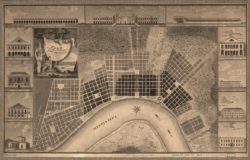Eulalie Mandeville
Eulalie Mandeville was an entrepreneur of extraordinary business acumen who became one of New Orleans' wealthiest free women of color.

Courtesy of Library of Congress, Geography and Map Division
Plan of the city and suburbs of New Orleans : from an actual survey made in 1815. Tanesse, I. Rollinson, William, 1762-1842. Del Vecchio, Charles. Maspero, P.
Eulalie Mandeville was an entrepreneur of extraordinary energy and business acumen, who became one of New Orleans’s wealthiest free women of color. The daughter of Count Pierre Philippe Mandeville de Marigny and a family slave named Marie Jeanne, she was the half-sister of Bernard de Marigny. In 1779, her paternal grandparents freed the child and raised her like a daughter. The de Marignys’ gave Eulalie several thousand dollars, slaves, cattle, and a tract of land in St. Bernard Parish when she was a young woman. With these resources she established a dairy.
In the early 1790s Eulalie Mandeville formed a long-lasting and highly successful partnership with Eugène Macarty, a member of the white Macarty family. Macarty leased Mandeville’s land for cutting timber and raising produce, which he marketed in New Orleans. In 1808 the couple moved into the city, and lived for the rest of their lives at the corner of Dauphine and Barracks streets. From this house Mandeville conducted a lucrative retail dry goods business, using her own female slaves and employing free woman of color as door-to-door vendors to sell fabrics, kerchiefs, shawls, and trimmings. Mandeville gave the profits from her commercial efforts to Macarty, a professional broker who managed her business and loaned the money to other New Orleanians at high interest.
Together Eulalie Mandeville and Eugène Macarty had seven children between 1794 and 1815. All of them were well educated; the daughters made advantageous matches and the sons were established in business. On October 22, 1845, despite the fact that interracial marriages were illegal at the time, they were married at St. Augustine’s Catholic Church. Macarty died a few days later.
Following his death, the Macarty family filed a lawsuit against Mandeville. They claimed that the cash, real estate, and slaves Mandeville possessed at the time of Macarty’s death belonged to his estate. They also argued that Macarty put assets in his partner’s name with the object of defrauding his legal heirs. In 1848, the year that Eulalie Mandeville died, the Macarty’s lost their appeal before the Supreme Court of Louisiana. The judge ruled that fraud on the part of Eugène Macarty and Eulalie Mandeville could not be proven, and that “No doubt parental love, the strongest tie on earth, suggested to both of them that their own children were better entitled to inherit the proceeds of their labor than collateral heirs for whom they felt little or no regard.”
